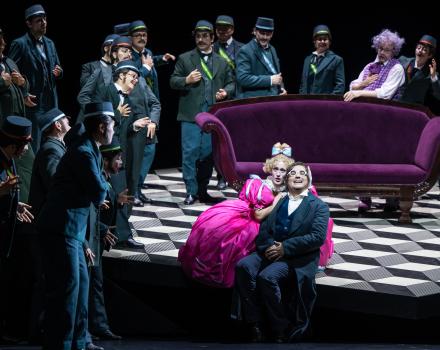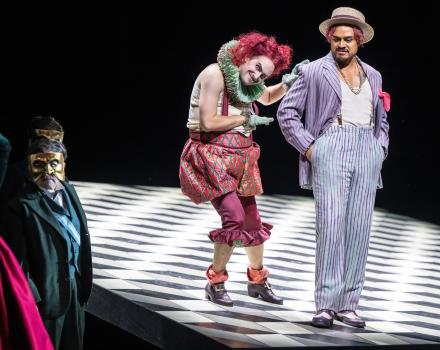
The Tales of Hoffmann

Hoffmann, the poet, is torn between art and life, love and fantasy, dream and reality. His love for Stella, the singer, remains unrequited, and he takes refuge in alcohol and the world of his imagination. Over the course of a wine-soaked evening, he tells his friends of three fantastical love affairs…
In his final opera, Jacques Offenbach made E.T.A. Hoffmann, the most famous poet of the Romantic period, into his main character. The poet explores the threshold between reality and fantasy in a fascinating way in his magical-surreal tales. The opera masterfully combines operetta, sentimental opéra comique and romantic-fantastic opera. Original melodic inventions merge with gripping drama and Offenbach’s subtle irony interrupts his main character’s rapturous states. Offenbach left his last opera unfinished. Since the posthumous premiere in 1881, different versions have been issued by various publishers. The Opernhaus Zürich has chosen the version published by the two editors Michael Kaye and Jean-Christophe Keck. First staged by Andreas Homoki in 2021 during the coronavirus pandemic, Zurich’s production now finally sees an audience in the Opernhaus and live online via OperaVision. After his successful 2021 debut in the title role, Saimir Pirgu returns as Hoffmann with Antonino Fogliani conducting the Philharmonia Zürich.
CAST
|
Hoffmann
|
Saimir Pirgu
|
|---|---|
|
La Muse / Nicklausse
|
Marina Viotti
|
|
Olympia
|
Katrina Galka
|
|
Antonia
|
Adriana Gonzalez
|
|
Giulietta
|
Lauren Fagan
|
|
Stella
|
Maria Stella Maurizi
|
|
Lindorf / Coppélius / Le docteur Miracle / Le capitaine Dapertutto
|
Andrew Foster-Williams
|
|
Andrès / Cochenille / Frantz / Pitichinaccio
|
Nathan Haller
|
|
Maître Luther
|
Valeriy Murga
|
|
Hermann
|
Steffan Lloyd Owen
|
|
Nathanaël
|
Christopher Willoughby
|
|
Wolfram
|
Maximilian Lawrie
|
|
Wilhelm / Le Capitaine des Sbires
|
Lobel Barun
|
|
Spalanzani
|
Daniel Norman
|
|
Crespel
|
Stanislav Vorobyov
|
|
La Voix de la tombe
|
Judith Schmid
|
|
Peter Schlémil
|
Samson Setu
|
|
Orchestra
|
Philharmonia Zürich
|
|
Chorus
|
Oper Zürich Chorus
|
| ... | |
|
Music
|
Jacques Offenbach
|
|---|---|
|
Text
|
Jules Paul Barbier
|
|
Director
|
Andreas Homoki
|
|
Conductor
|
Antonino Fogliani
|
|
Stage Design
|
Wolfgang Gussmann
|
|
Costumes
|
Wolfgang Gussmann
Susana Mendoza
|
|
Co-set designer
|
Thomas Bruner
|
|
Lighting Design
|
Franck Evin
|
|
Chorus master
|
Janko Kastelic
|
|
Dramaturgy
|
Beate Breidenbach
|
| ... | |
VIDEOS
STORY
Act I
The Muse would like to win Hoffmann back – both for herself and for art. To this end, she impersonates the student Nicklausse so as to enable her to accompany Hoffmann on his adventures. While Mozart’s Don Giovanni is being performed at the theatre next door, a group of students gather to spend an evening of carousing at Luther’s Wine Cellar. They are joined by Hoffmann and Nicklausse. Hoffmann has fallen for Stella, who is singing the role of Donna Anna. Stella’s servant is supposed to be bringing Hoffmann a letter containing the key to her dressing room, but Lindorf, who also desires the singer, intercepts the envelope with a view to paying her a visit himself. Hoffmann keeps everyone amused by singing the ballad of Kleinzach. Yet his thoughts constantly return to Stella. He eventually starts talking about three of the women he has known in his life.
Act II
In the physicist Spalanzani’s house, Hoffmann comes across the beautiful Olympia. He chooses to ignore Nicklausse’s ironic remarks about Olympia being just a doll. Coppélius, who introduces himself as a friend of Spalanzani’s and is a dealer in optical devices and artificial eyes, sells the poet a pair of miracle spectacles, thanks to which Hoffmann indeed finds Olympia’s performance all the more beguiling. He confesses his feelings to Olympia – and interprets her monosyllabic responses of “yes, yes” as passionate protestations of love. During the fast waltz that he then dances with Olympia, the doll rapidly becomes uncontrollable, and Hoffmann loses his spectacles. In the meantime, Coppélius, who made Olympia’s eyes, has discovered that the cheque with which Spalanzani intended to fob him off is worthless. Enraged, he returns and destroys the doll. Hoffmann realises that he has been in love with an automaton.
Act III
Antonia, Crespel the violin maker’s daughter, is singing a wistful song. Her father, however, forbids her to sing, as she is risking her life – Antonia’s mother, a celebrated singer, died of the same mysterious disease. Crespel impresses on his servant Frantz not to let anybody into the house. Frantz, however, is hard of hearing, and when Hoffmann appears, he gives him a warm welcome. Antonia and Hoffmann fall into one another’s arms. When Crespel returns, Hoffmann hides and witnesses Doctor Miracle examining Antonia. Crespel turns Miracle out of the house, as he believes that the mysterious doctor is responsible for his wife’s death and that he will also kill Antonia. Hoffmann has now learned that Antonia is doomed to die if she continues to sing. Alone with her again, he makes her promise to relinquish her singing career. Scarcely has Hoffmann left than Miracle returns and describes to Antonia the splendid life of a singer in glowing colours. Antonia attempts to resist the temptation with all her strength and to keep her promise, but when her departed mother appears, she joins in her song – and dies.
Act IV
Hoffmann has decided to renounce all romantic sentiments and to devote himself entirely to transient pleasures. Then, however, he encounters the courtesan Giulietta, who maintains mysterious links to Capitaine Dapertutto. Giulietta introduces Hoffmann to her other guests – these include Schlemihl, who is in possession of her key. Dapertutto orders Giulietta to seduce Hoffmann and demand that he give her his reflection; she has already procured Schlemihl’s shadow for Dapertutto in the same manner. When Giulietta hesitates, Dapertutto tells the courtesan how disparagingly Hoffmann has spoken of her. Giulietta now agrees to Dapertutto’s request and easily succeeds in seducing Hoffmann. In order to gain possession of Giulietta’s key, Hoffmann kills Schlemihl in a duel. Schlemihl’s death is discovered; Hoffmann is forced to flee. Giulietta implores him at least to entrust his shadow to her if he has to leave her. Hoffmann consents – and realises that Giulietta has deceived him.
Act V
Back at the wine cellar, Hoffmann has finished telling his stories, and the performance of Don Giovanni has also come to an end. After her triumph as Donna Anna, Stella has waited for Hoffmann to no avail. Together with Lindorf, she now appears in the wine cellar. Hoffmann, however, is drunk and mocks both of them as he sings the last verse of the ballad of Kleinzach. When Hoffmann learns that Stella has written him a letter that he never received, he is distraught. Will Stella forgive him?
INSIGHTS
The fun is in the situations Offenbach creates
An interview with director Andreas Homoki
Before the premiere, director Andreas Homoki talked to dramaturge Beate Breidenbach about the opera’s black romanticism and chimerical images of women as well as the challenges that lie in the work’s convoluted form and the stylistic virtuosity of a composer who knows every trick in the theatre book.
At the centre of Jacques Offenbach’s opera The Tales of Hoffmann is the poet E.T.A. Hoffmann, whose novellas and novels were immensely popular in mid-19th-century Paris. What did you focus on first when preparing your production, the poet Hoffmann or the composer Offenbach?
The opera is very well known; of course I have seen it on stage many times. And I have always loved the author E.T.A. Hoffmann. For my production, I initially focussed on the form of this opera – three stories, framed by a prologue and an epilogue. In many performances, this framework has not really become clear to me; most of the time, I had the impression to watch different stories, with different effects, which were only insufficiently connected to each other. That is why I felt the need to find a formal solution for my production without getting lost in the individual episodes. Dealing with the form went hand in hand with researching into the genesis of the piece. It is a fragment, after all, and the fourth act was unknown for a long time. To this day, this Giulietta act, which Offenbach left unfinished, raises many questions; the story does not seem to have been fully developed. This is particularly noticeable when you compare this act with the preceding Antonia act, which is incredibly strong and self-contained. So at the beginning of my involvement with this piece, I was more concerned with formal than with content-related considerations.
With regard to content, what is this piece about for you?
I have the feeling that very clever, business-minded theatre people have taken a popular material and extracted stories from it. Pragmatic aspects, such as which talented and popular artists were available at the time, may have played into this. The author’s goal was to achieve success by making these many different facets shine. This character Hoffmann never really existed. It is assumed that E.T.A. Hoffmann is actually the protagonist of these stories; this is of course unfair to the great poet and his relationships with women, which were not easy, but certainly not like portrayed in the opera. For me, Les Contes d’Hoffmann is above all unbelievably great musical theatre, with an extraordinary and unique range of styles and affects. The fun is in the details, in the situations that Offenbach creates. It is all about black romanticism, black magic and evil forces; it is scary, but can also be very funny at times. This versatility of the piece should not be overwhelmed by an overly philosophical approach.
But is The Tales of Hoffmann not also an artist opera? In the prologue, the Muse says that she wants to distract Hoffmann from his women’s stories so that he can devote himself entirely to poetry. Who is this Muse for you?
The Muse disguises herself as Nicklausse right at the beginning; she becomes Hoffmann’s male companion and is therefore an androgynous figure. Ultimately, however, she is a kind of goddess who loves this Hoffmann, just as Pallas Athena loves Odysseus. However, Hoffmann, as we are introduced to him in the prologue, is a heavy drinker who has cynically come to terms with his life; once again, this does not quite do justice to the historical Hoffmann, who is said to have enjoyed wine, but was probably not as self-destructive as the Hoffmann in the opera. It is a nice frame story – an artist who has bad luck with women but draws his art from it. The Muse now wants him to only make art. This opens up a polarity between art and love, which is, however, not really played out. The three individual stories are motivated by this, but you do not get the feeling that you go home with a message at the end. As a director, I have to come up with something for that. And that really only emerged for me during the rehearsal process. The conductor Antonino Fogliani and I realised together that it would be nice to take this web of relationships between Hoffmann, the Muse and the singer Stella, which is set in the prologue, and pick it up again at the end. We imagined what would happen if Hoffmann’s relationship with Stella had more potential after all; that would mean that the artist could combine his love and his creativity after all. This would resolve the contradiction formulated by the Muse at the beginning – I am the Muse and I love the poet Hoffmann, but he loves Stella, who prevents him from writing poetry, so she is my rival; this contradiction would be resolved in the end.
So art cannot be created without life experience…
Yes, but one should not simply equate an artist’s life with his work.
Let us talk about the three women in the play. Each of the three stories Hoffmann tells as memories from his life is about failed love affairs: In the Olympia Act, Hoffmann has to face that he has fallen in love with a doll; in the Antonia Act, the lover dies by singing herself to death; and in the Giulietta Act, Hoffmann is betrayed by a courtesan who is cooperating with the devil. Are these three women more than male projections?
They correspond to a reduced 19th-century image of women. Women were not really taken seriously. The man controls everything, the woman has to make do with certain role models, ideally that of housewife and mother, of course. Then there are projections that deviate from this, such as the deeply emotional artist Antonia, who falls in love with her art and thus represents the typical female victim in opera, which can be so beautifully shocking. Or the femme fatale, the courtesan, who is after all an independent woman; and the doll, who corresponds to a strangely reduced erotic fantasy. In other words, three female clichés that are created when women are not taken seriously by men. From this perspective, it is only fair that Hoffmann fails because of these three women. But there is also Stella, who exists in the present and who is said to combine all three of these women. That is not necessarily a compliment, if you take it literally. For me, it means above all that Stella is a woman who is on a par with Hoffmann. It is significant that she is a singer independent of a husband and not a Biedermeier housewife.
Hoffmann’s adversary in the real world is Lindorf, who also has his eye on Stella. In the three stories told by Hoffmann, we encounter him again in different roles; while Hoffmann’s personality seems to dissolve more and more, to the point of losing his mirror image, his adversary becomes stronger and stronger...
For me, the relationship between Hoffmann and this antagonist has a similar quality like Faust and Mephisto. That is the arc that holds the piece together; Hoffmann’s stories are a journey through his memories, triggered and accompanied by this Mephistophelean figure, who repeatedly intervenes in the stories under different names (Coppélius, Dr Miracle and Dapertutto) and is always recognisably the same person, albeit in disguise. However, the two forces fighting against each other in the competition for Hoffmann are actually the Muse and Mephisto – good versus evil.
And the good force wins the battle in the end?
The audience is in for a surprise...
One often reads that with The Tales of Hoffmann Offenbach had finally fulfilled his dream of a serious work after gigantic successes with the comic genre; but is it not rather the case that this work unites many different styles and genres?
Yes, absolutely! The Olympia Act in particular has a lot of comic potential. I have to admit that it was only when I started working on this play that I became aware of Offenbach’s full genius – a theatre practitioner who mastered all the styles and genres of his time with virtuosity and yet still had his very own signature style. He was also blessed with an incredible wealth of melodic invention. The complete opposite, by the way, of a figure like Wagner, who based every piece on a philosophical idea and constructed his characters accordingly; Wagner’s operas were already perfectly worked out at the desk. Offenbach, on the other hand, was completely different. He was not committed to an overall concept, but above all to the sensual theatre experience and created an insanely pleasurable theatre that is always a reflection of life and also thrives on contradiction. Magnificent!
It is therefore all the sadder that Offenbach, a theatre practitioner, was not able to witness the premiere of his last work. There is no definitive version of this opera, and every director today has to create their own version from the many variants that have survived.
Yes, and one senses that the fourth act has not really been completed. Sometimes I wish Offenbach would come through the door and see what we have done. I hope he would like it...
A word about our cast. You decided to cast the three female roles with three different singers.
This gives each act its very own colour. Even though the play says, as I said, that the three women are different aspects of a single woman, Stella, I think you lose something if you cast all three or four female roles with the same singer.
The interview was conducted by dramaturge Beate Breidenbach. Translated from the German original.
GALLERY











